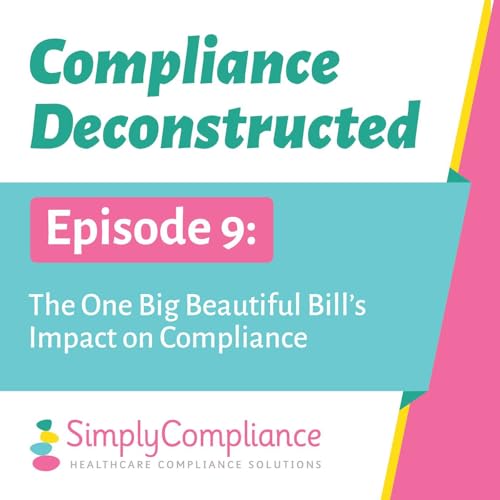
One Big Beautiful Bill Act Explained: What You Need to Know
No se pudo agregar al carrito
Add to Cart failed.
Error al Agregar a Lista de Deseos.
Error al eliminar de la lista de deseos.
Error al añadir a tu biblioteca
Error al seguir el podcast
Error al dejar de seguir el podcast
-
Narrado por:
-
De:
In this episode of Compliance Deconstructed, hosts Jessica Zeff, Lorie Davis, and Elvan Baker break down the complexities of the “Big Beautiful Bill” and its potential impact on healthcare. The conversation highlights both the bill’s stated goal of simplifying billing and the unintended consequences that could create new challenges for patients and professionals alike.
For compliance professionals and healthcare leaders, understanding healthcare policy changes requires more than reading the surface-level intentions. It’s important to critically examine proposed regulations, compare goals with likely outcomes, and identify potential risks such as coverage gaps, workforce shortages, or added administrative burdens…ensuring your organization remains compliant and patients continue to receive uninterrupted care.
Jessica, Lorie, and Elvan also explore how this bill could affect vulnerable populations, including patients who depend on Medicaid and other essential programs. With proposed changes to eligibility redeterminations, many patients may face instability in maintaining coverage, placing a significant strain on state agencies, health plans, and the individuals themselves.
And if all that weren’t enough, the discussion focuses strongly on how healthcare workforce development could suffer if provisions around student loans and loan forgiveness are limited. These changes may deter new professionals from entering the field, deepening existing shortages and reducing patient access to critical care. This conversation emphasizes the importance of proactive planning, cross-department collaboration, and continuous monitoring of legislative updates to stay ahead of potential disruptions.
Key Takeaways
- The Big Beautiful Bill aims to improve billing transparency but may unintentionally create new administrative hurdles.
- More frequent Medicaid eligibility reviews could increase the risk of coverage gaps for vulnerable populations.
- Administrative changes may shift focus away from patient simplification and toward compliance burdens.
- Proposed changes to student loan programs could deter individuals from entering healthcare professions.
- Compliance professionals should conduct risk assessments and plan proactively for operational impacts.
- Staying informed and engaging stakeholders is essential to navigating evolving healthcare regulations.
Learn more about Healthcare Compliance and discover how Simply Compliance can help your company at simplycomplianceconsulting.com.



